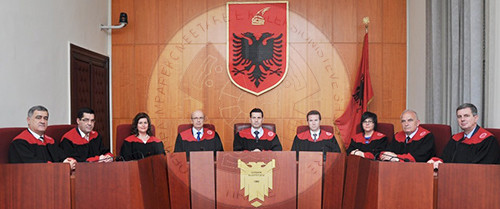Vetting’s law must go back to the Constitutional Court’s test. The Union and Judges’ Association have joined a new lawsuit against several specific Articles of Vetting, as well as some points in two other basic laws on judicial reform.
It is about the law of the judiciary governing bodies and the status of judges.
But the greatest sensitivity remains to the Vetting law, because its implementation is directly related to the country’s integration process.
One of the most delicate complaints faces of judges is related to the control of the image of the people of justice, but judges say that including “persons suspected of involvement in organized crime”, according to “confidential information” without a decision of the form This can lead to abusive decisions of the Vetting Commission.
When the law was passed, verification of the image, in addition to property control, was considered as one of the pillars of the Vetting process. It was publicly supported by both Americans and Europeans with the Venice Commission’s argument that Vetting’s drastic measures were acceptable to resolve a situation like that in Albanian justice.
The internationals are concerned after the Constitutional Court accepted the appeal of the Association and the Union of Judges against the law of Vetting, the law that was once tried at the end of last year after a Democratic Party’s request that was overthrown.
Already this law, after the 18 May agreement, has the full support of the Democratic Party for the establishment of the Vetting Commissions.
An unusual fact for such a case is the speed with which the Constitutional Court has gathered and has decided in less than a week since the submission of the request and has decided not to make public hearings but to adjudicate the case quickly and on the basis of documents.
Top Channel learned that the Constitutional Court has asked the Assembly, as the only party to the trial, to present its position on each of the points challenged by the judges by 22 June.
Time, which is also the climax of the electoral campaign, coincides with the period that the Parliament must decide to set up Vetting Committees, a process that is being conducted with the opposition but not yet completed.
On Tuesday, Enlargement Commissioner Johannes Hahn made it clear that Vettingu in the form adopted and being implemented is a non-negotiable condition for opening negotiations after a free and fair election process on June 25th.
***
At the request of the Union and the Association of Mothers it is said that some articles that define the conditions for the selection of members for the High Judicial Council and the High Council of Prosecution are in contravention of the Constitution of the country.
Specifically, the Constitutional Court requires the abrogation of Article 7, points A and C, which stipulates that judges at the time of nomination for the High Judicial Council should have exercised the function of the judge for at least ten years and be assessed “very well” in Two recent assessments of ethical and professional performance.
The abrogation of point 1 of article 59 is also required, stating that the chairman and deputy chairman of the High Judicial Council are elected at the first meeting of the HRC from among the non-judges and by the simple majority vote of the members . Here, judges seek to remove the word “deputy chairman”.
The judges also request a change in item 8 of Article 62, which states that the Strategic Planning and Budget Management Committee consists of two non-judicial members and one member of the Judge. They ask for the words “two non-judges and one judge member” to be removed.
The same is required for item 13 of Article 62, which sets out the review of the appeal of decisions of the High Inspectorate of Justice.
The request of the Union and the Association of Judges was made on May 25 and it is learned that it was accepted by the Constitutional Court.
Get it from mapo.al

